ERP System Selection and Implementation: Business Strategy Analysis
VerifiedAdded on 2022/11/15
|8
|1518
|70
Essay
AI Summary
This essay analyzes the implementation of an ERP system in a business context. It begins by introducing the concept of ERP and its functionalities, emphasizing its role in streamlining business operations. The essay then presents a case study, using Nestle as an example to illustrate the practical application and benefits of ERP implementation. Furthermore, the essay discusses the desired functionalities of an ERP system, explaining how these features can contribute to business growth and efficiency. Finally, it outlines an action plan for selecting and implementing an enterprise software, including change management strategies, based on the knowledge gained. The essay covers various aspects of ERP, from its core functions to the strategic considerations involved in its adoption and management.
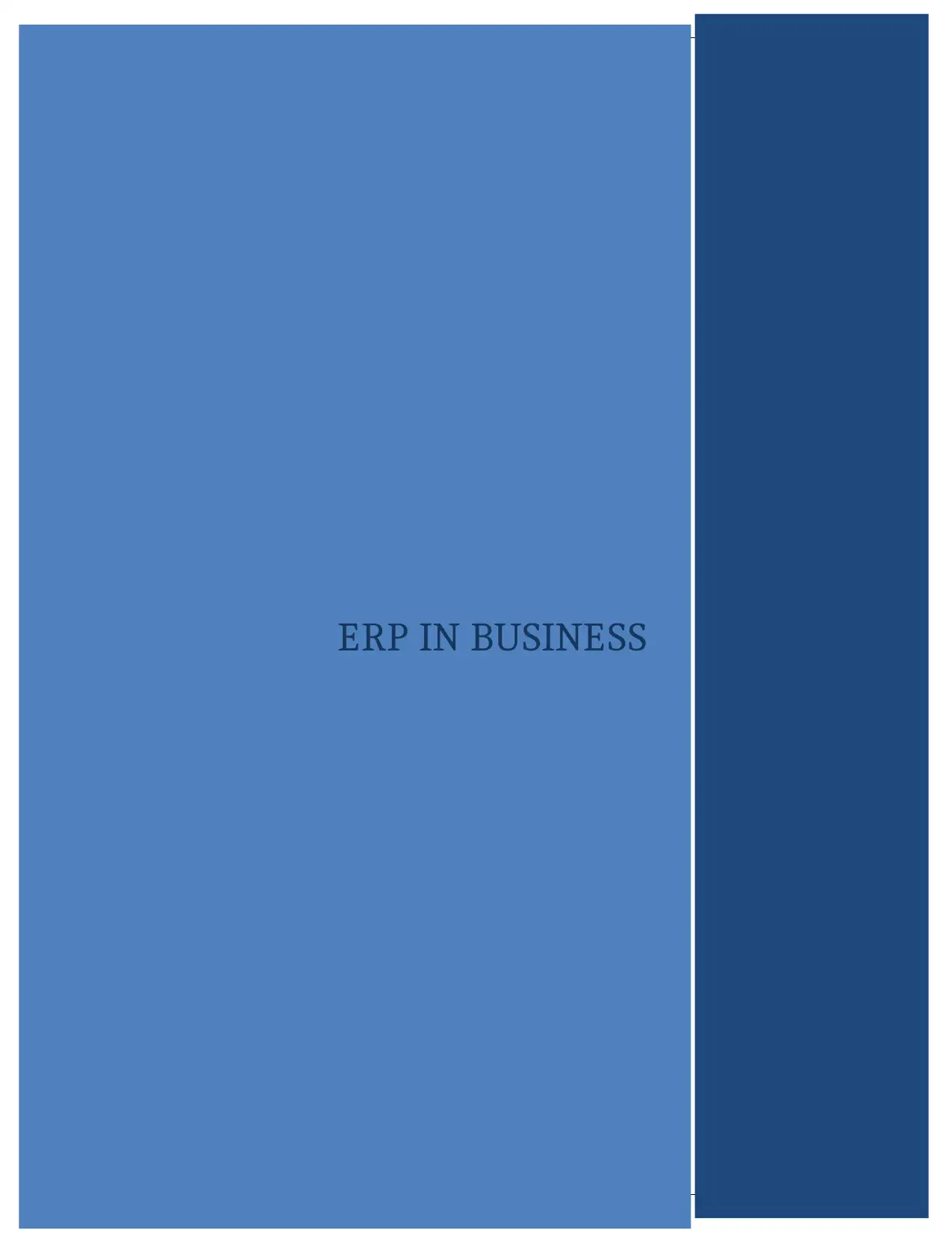
Running r
ERP IN BUSINESS
ERP IN BUSINESS
Paraphrase This Document
Need a fresh take? Get an instant paraphrase of this document with our AI Paraphraser
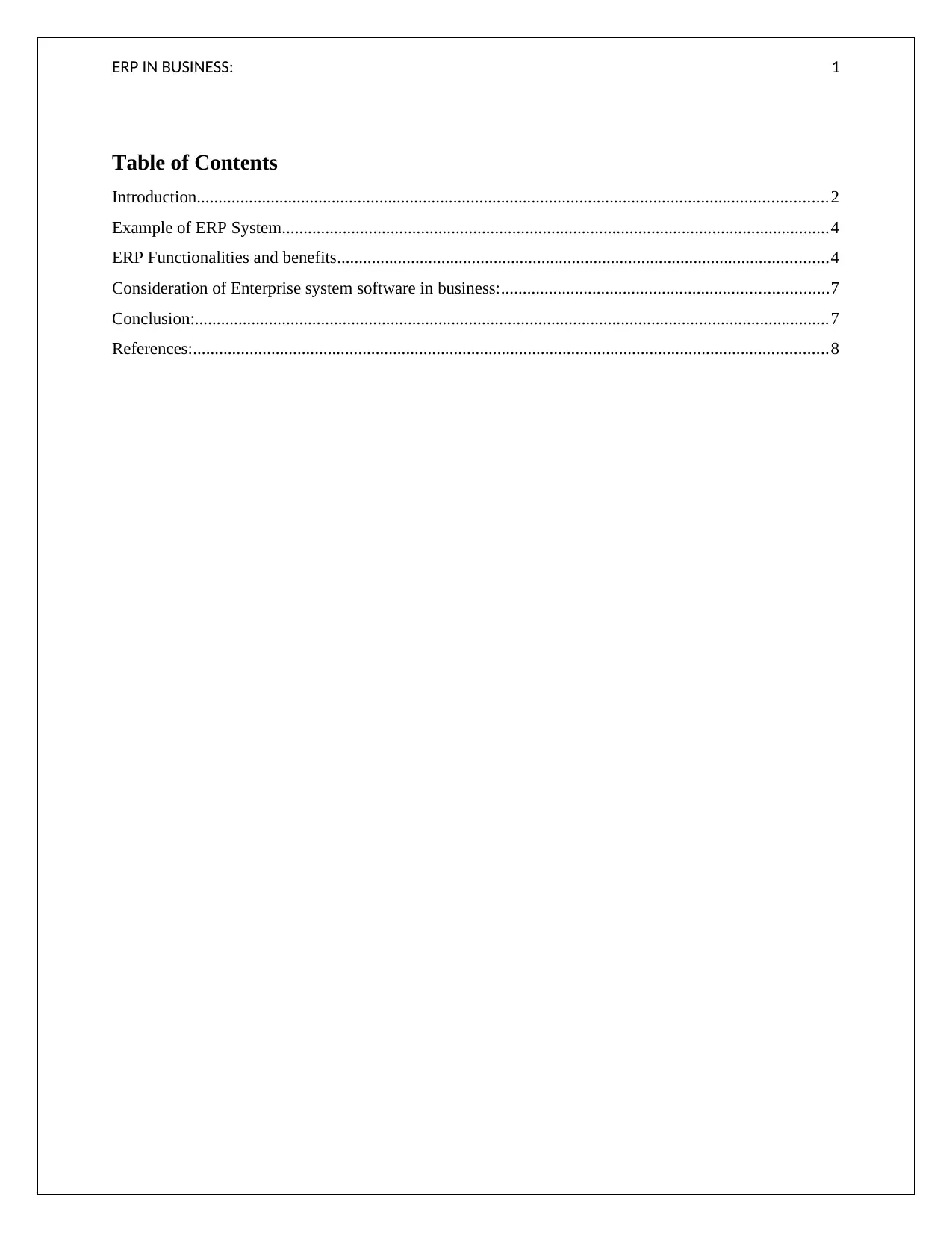
ERP IN BUSINESS: 1
Table of Contents
Introduction.................................................................................................................................................2
Example of ERP System..............................................................................................................................4
ERP Functionalities and benefits.................................................................................................................4
Consideration of Enterprise system software in business:...........................................................................7
Conclusion:..................................................................................................................................................7
References:..................................................................................................................................................8
Table of Contents
Introduction.................................................................................................................................................2
Example of ERP System..............................................................................................................................4
ERP Functionalities and benefits.................................................................................................................4
Consideration of Enterprise system software in business:...........................................................................7
Conclusion:..................................................................................................................................................7
References:..................................................................................................................................................8
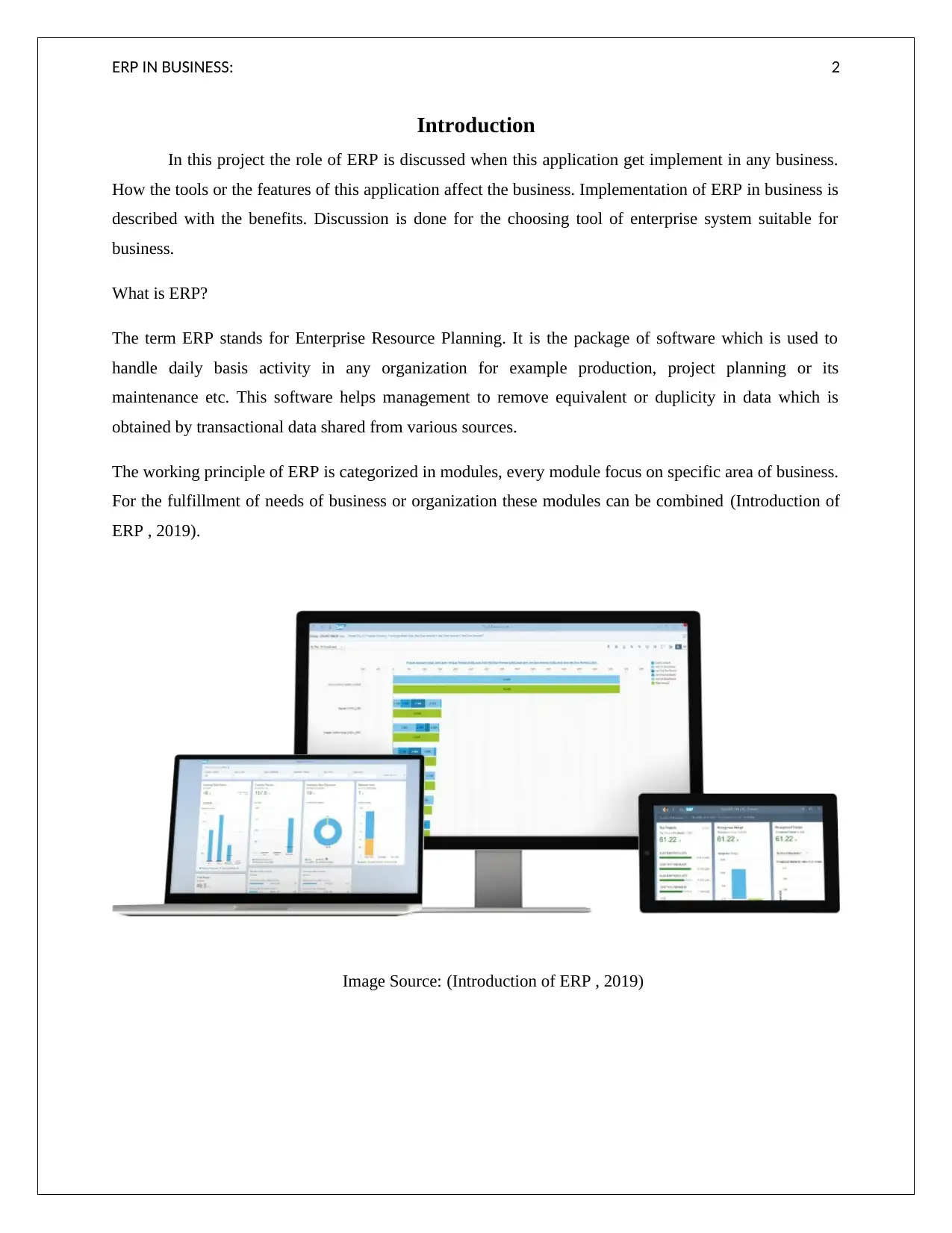
ERP IN BUSINESS: 2
Introduction
In this project the role of ERP is discussed when this application get implement in any business.
How the tools or the features of this application affect the business. Implementation of ERP in business is
described with the benefits. Discussion is done for the choosing tool of enterprise system suitable for
business.
What is ERP?
The term ERP stands for Enterprise Resource Planning. It is the package of software which is used to
handle daily basis activity in any organization for example production, project planning or its
maintenance etc. This software helps management to remove equivalent or duplicity in data which is
obtained by transactional data shared from various sources.
The working principle of ERP is categorized in modules, every module focus on specific area of business.
For the fulfillment of needs of business or organization these modules can be combined (Introduction of
ERP , 2019).
Image Source: (Introduction of ERP , 2019)
Introduction
In this project the role of ERP is discussed when this application get implement in any business.
How the tools or the features of this application affect the business. Implementation of ERP in business is
described with the benefits. Discussion is done for the choosing tool of enterprise system suitable for
business.
What is ERP?
The term ERP stands for Enterprise Resource Planning. It is the package of software which is used to
handle daily basis activity in any organization for example production, project planning or its
maintenance etc. This software helps management to remove equivalent or duplicity in data which is
obtained by transactional data shared from various sources.
The working principle of ERP is categorized in modules, every module focus on specific area of business.
For the fulfillment of needs of business or organization these modules can be combined (Introduction of
ERP , 2019).
Image Source: (Introduction of ERP , 2019)
⊘ This is a preview!⊘
Do you want full access?
Subscribe today to unlock all pages.

Trusted by 1+ million students worldwide
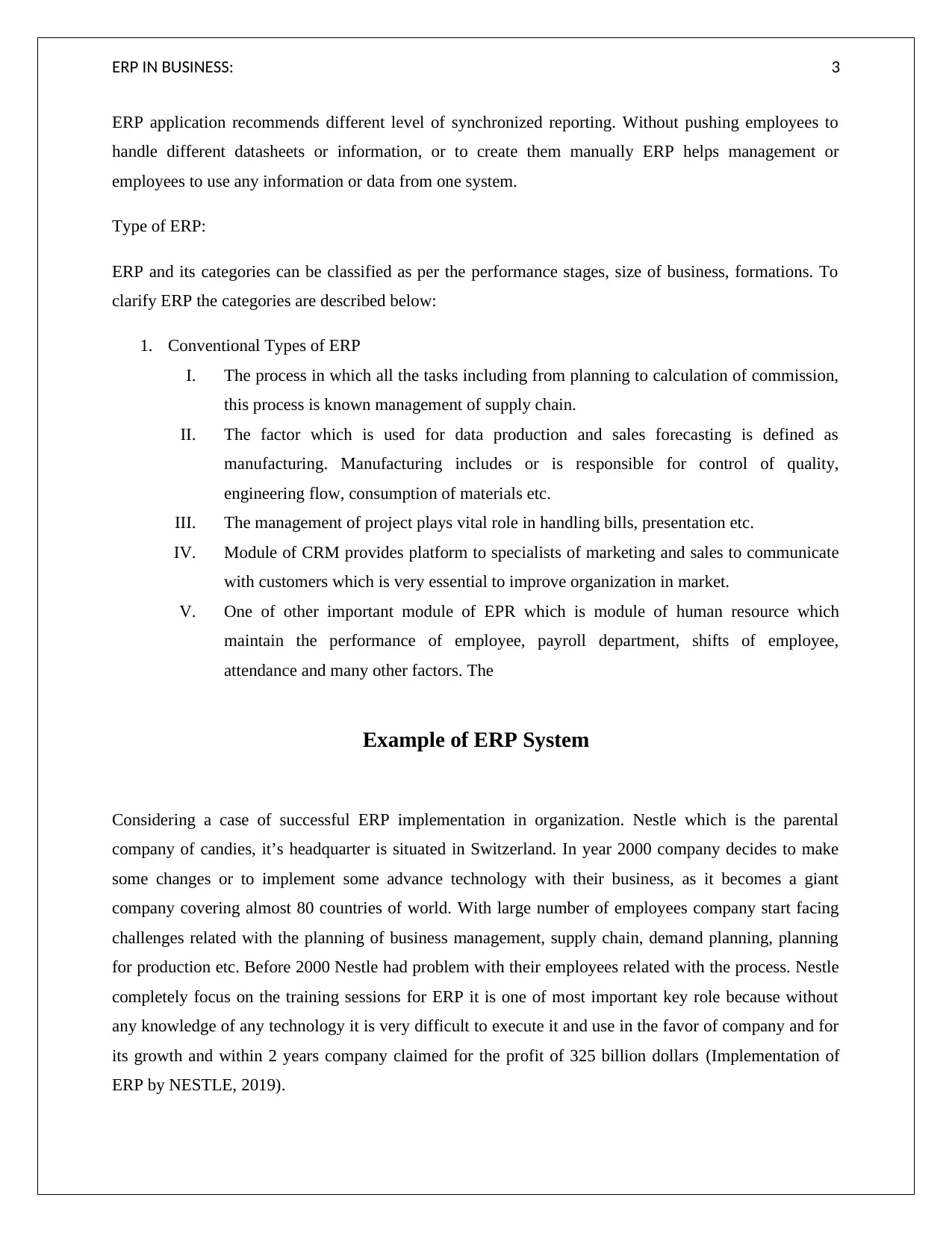
ERP IN BUSINESS: 3
ERP application recommends different level of synchronized reporting. Without pushing employees to
handle different datasheets or information, or to create them manually ERP helps management or
employees to use any information or data from one system.
Type of ERP:
ERP and its categories can be classified as per the performance stages, size of business, formations. To
clarify ERP the categories are described below:
1. Conventional Types of ERP
I. The process in which all the tasks including from planning to calculation of commission,
this process is known management of supply chain.
II. The factor which is used for data production and sales forecasting is defined as
manufacturing. Manufacturing includes or is responsible for control of quality,
engineering flow, consumption of materials etc.
III. The management of project plays vital role in handling bills, presentation etc.
IV. Module of CRM provides platform to specialists of marketing and sales to communicate
with customers which is very essential to improve organization in market.
V. One of other important module of EPR which is module of human resource which
maintain the performance of employee, payroll department, shifts of employee,
attendance and many other factors. The
Example of ERP System
Considering a case of successful ERP implementation in organization. Nestle which is the parental
company of candies, it’s headquarter is situated in Switzerland. In year 2000 company decides to make
some changes or to implement some advance technology with their business, as it becomes a giant
company covering almost 80 countries of world. With large number of employees company start facing
challenges related with the planning of business management, supply chain, demand planning, planning
for production etc. Before 2000 Nestle had problem with their employees related with the process. Nestle
completely focus on the training sessions for ERP it is one of most important key role because without
any knowledge of any technology it is very difficult to execute it and use in the favor of company and for
its growth and within 2 years company claimed for the profit of 325 billion dollars (Implementation of
ERP by NESTLE, 2019).
ERP application recommends different level of synchronized reporting. Without pushing employees to
handle different datasheets or information, or to create them manually ERP helps management or
employees to use any information or data from one system.
Type of ERP:
ERP and its categories can be classified as per the performance stages, size of business, formations. To
clarify ERP the categories are described below:
1. Conventional Types of ERP
I. The process in which all the tasks including from planning to calculation of commission,
this process is known management of supply chain.
II. The factor which is used for data production and sales forecasting is defined as
manufacturing. Manufacturing includes or is responsible for control of quality,
engineering flow, consumption of materials etc.
III. The management of project plays vital role in handling bills, presentation etc.
IV. Module of CRM provides platform to specialists of marketing and sales to communicate
with customers which is very essential to improve organization in market.
V. One of other important module of EPR which is module of human resource which
maintain the performance of employee, payroll department, shifts of employee,
attendance and many other factors. The
Example of ERP System
Considering a case of successful ERP implementation in organization. Nestle which is the parental
company of candies, it’s headquarter is situated in Switzerland. In year 2000 company decides to make
some changes or to implement some advance technology with their business, as it becomes a giant
company covering almost 80 countries of world. With large number of employees company start facing
challenges related with the planning of business management, supply chain, demand planning, planning
for production etc. Before 2000 Nestle had problem with their employees related with the process. Nestle
completely focus on the training sessions for ERP it is one of most important key role because without
any knowledge of any technology it is very difficult to execute it and use in the favor of company and for
its growth and within 2 years company claimed for the profit of 325 billion dollars (Implementation of
ERP by NESTLE, 2019).
Paraphrase This Document
Need a fresh take? Get an instant paraphrase of this document with our AI Paraphraser
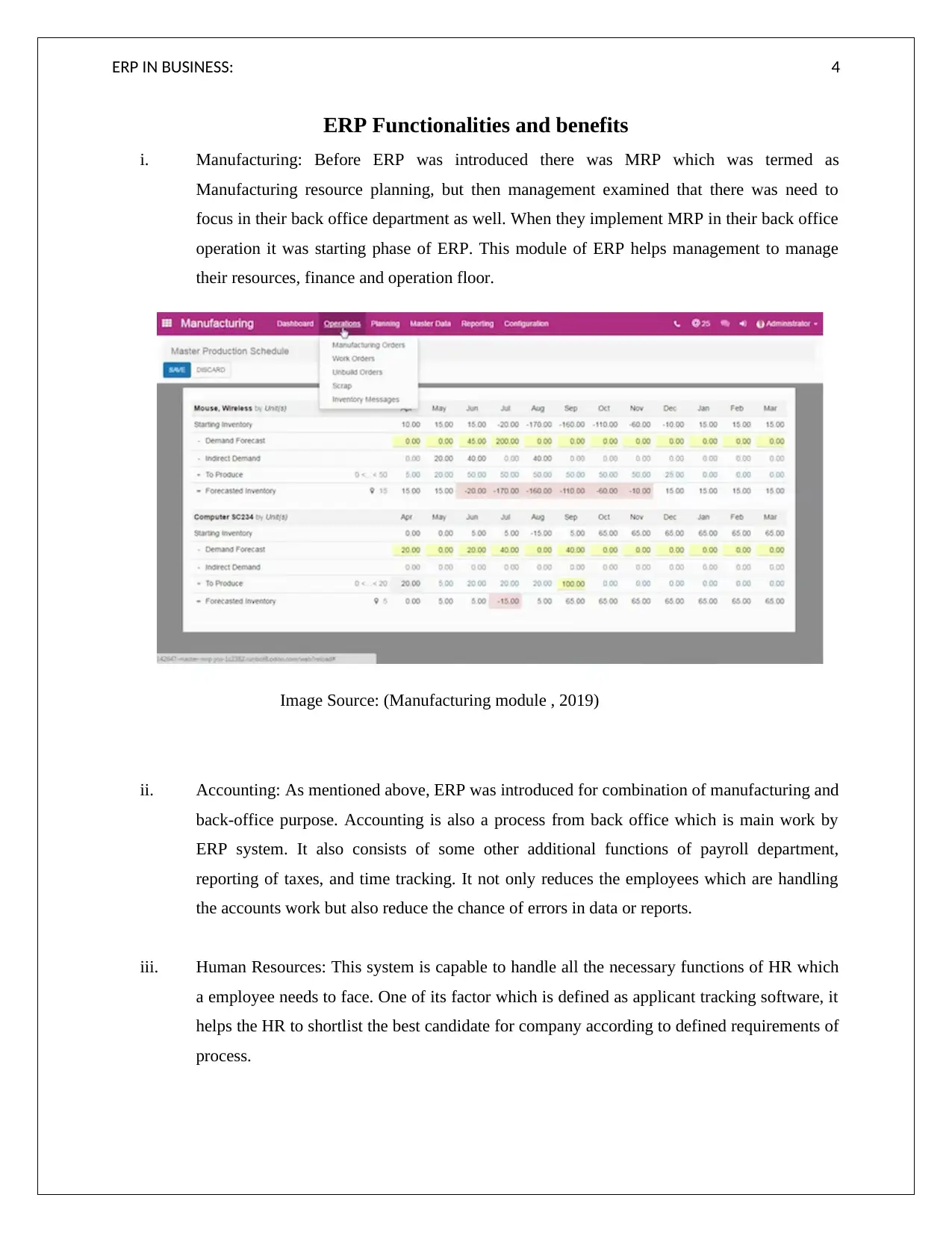
ERP IN BUSINESS: 4
ERP Functionalities and benefits
i. Manufacturing: Before ERP was introduced there was MRP which was termed as
Manufacturing resource planning, but then management examined that there was need to
focus in their back office department as well. When they implement MRP in their back office
operation it was starting phase of ERP. This module of ERP helps management to manage
their resources, finance and operation floor.
Image Source: (Manufacturing module , 2019)
ii. Accounting: As mentioned above, ERP was introduced for combination of manufacturing and
back-office purpose. Accounting is also a process from back office which is main work by
ERP system. It also consists of some other additional functions of payroll department,
reporting of taxes, and time tracking. It not only reduces the employees which are handling
the accounts work but also reduce the chance of errors in data or reports.
iii. Human Resources: This system is capable to handle all the necessary functions of HR which
a employee needs to face. One of its factor which is defined as applicant tracking software, it
helps the HR to shortlist the best candidate for company according to defined requirements of
process.
ERP Functionalities and benefits
i. Manufacturing: Before ERP was introduced there was MRP which was termed as
Manufacturing resource planning, but then management examined that there was need to
focus in their back office department as well. When they implement MRP in their back office
operation it was starting phase of ERP. This module of ERP helps management to manage
their resources, finance and operation floor.
Image Source: (Manufacturing module , 2019)
ii. Accounting: As mentioned above, ERP was introduced for combination of manufacturing and
back-office purpose. Accounting is also a process from back office which is main work by
ERP system. It also consists of some other additional functions of payroll department,
reporting of taxes, and time tracking. It not only reduces the employees which are handling
the accounts work but also reduce the chance of errors in data or reports.
iii. Human Resources: This system is capable to handle all the necessary functions of HR which
a employee needs to face. One of its factor which is defined as applicant tracking software, it
helps the HR to shortlist the best candidate for company according to defined requirements of
process.
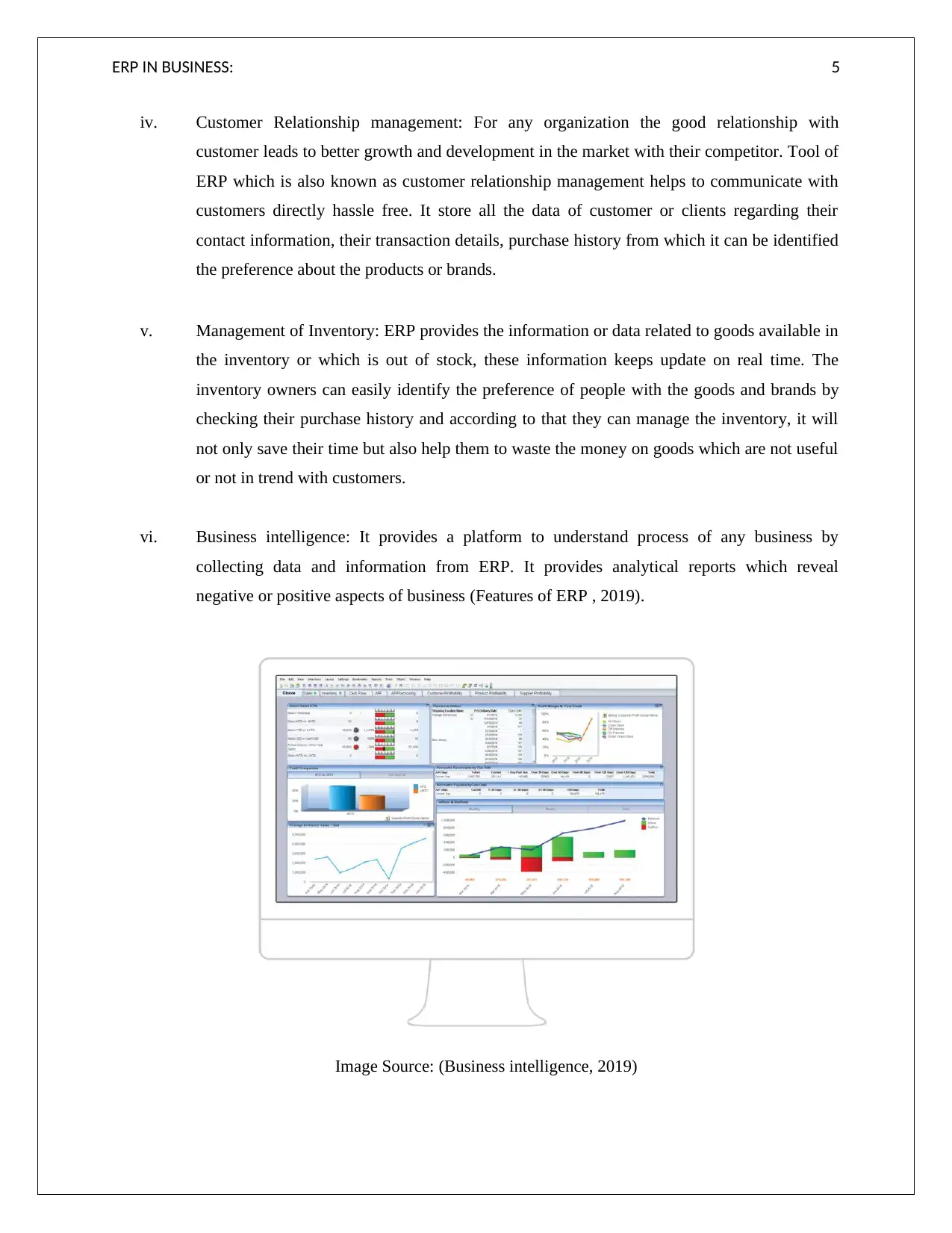
ERP IN BUSINESS: 5
iv. Customer Relationship management: For any organization the good relationship with
customer leads to better growth and development in the market with their competitor. Tool of
ERP which is also known as customer relationship management helps to communicate with
customers directly hassle free. It store all the data of customer or clients regarding their
contact information, their transaction details, purchase history from which it can be identified
the preference about the products or brands.
v. Management of Inventory: ERP provides the information or data related to goods available in
the inventory or which is out of stock, these information keeps update on real time. The
inventory owners can easily identify the preference of people with the goods and brands by
checking their purchase history and according to that they can manage the inventory, it will
not only save their time but also help them to waste the money on goods which are not useful
or not in trend with customers.
vi. Business intelligence: It provides a platform to understand process of any business by
collecting data and information from ERP. It provides analytical reports which reveal
negative or positive aspects of business (Features of ERP , 2019).
Image Source: (Business intelligence, 2019)
iv. Customer Relationship management: For any organization the good relationship with
customer leads to better growth and development in the market with their competitor. Tool of
ERP which is also known as customer relationship management helps to communicate with
customers directly hassle free. It store all the data of customer or clients regarding their
contact information, their transaction details, purchase history from which it can be identified
the preference about the products or brands.
v. Management of Inventory: ERP provides the information or data related to goods available in
the inventory or which is out of stock, these information keeps update on real time. The
inventory owners can easily identify the preference of people with the goods and brands by
checking their purchase history and according to that they can manage the inventory, it will
not only save their time but also help them to waste the money on goods which are not useful
or not in trend with customers.
vi. Business intelligence: It provides a platform to understand process of any business by
collecting data and information from ERP. It provides analytical reports which reveal
negative or positive aspects of business (Features of ERP , 2019).
Image Source: (Business intelligence, 2019)
⊘ This is a preview!⊘
Do you want full access?
Subscribe today to unlock all pages.

Trusted by 1+ million students worldwide
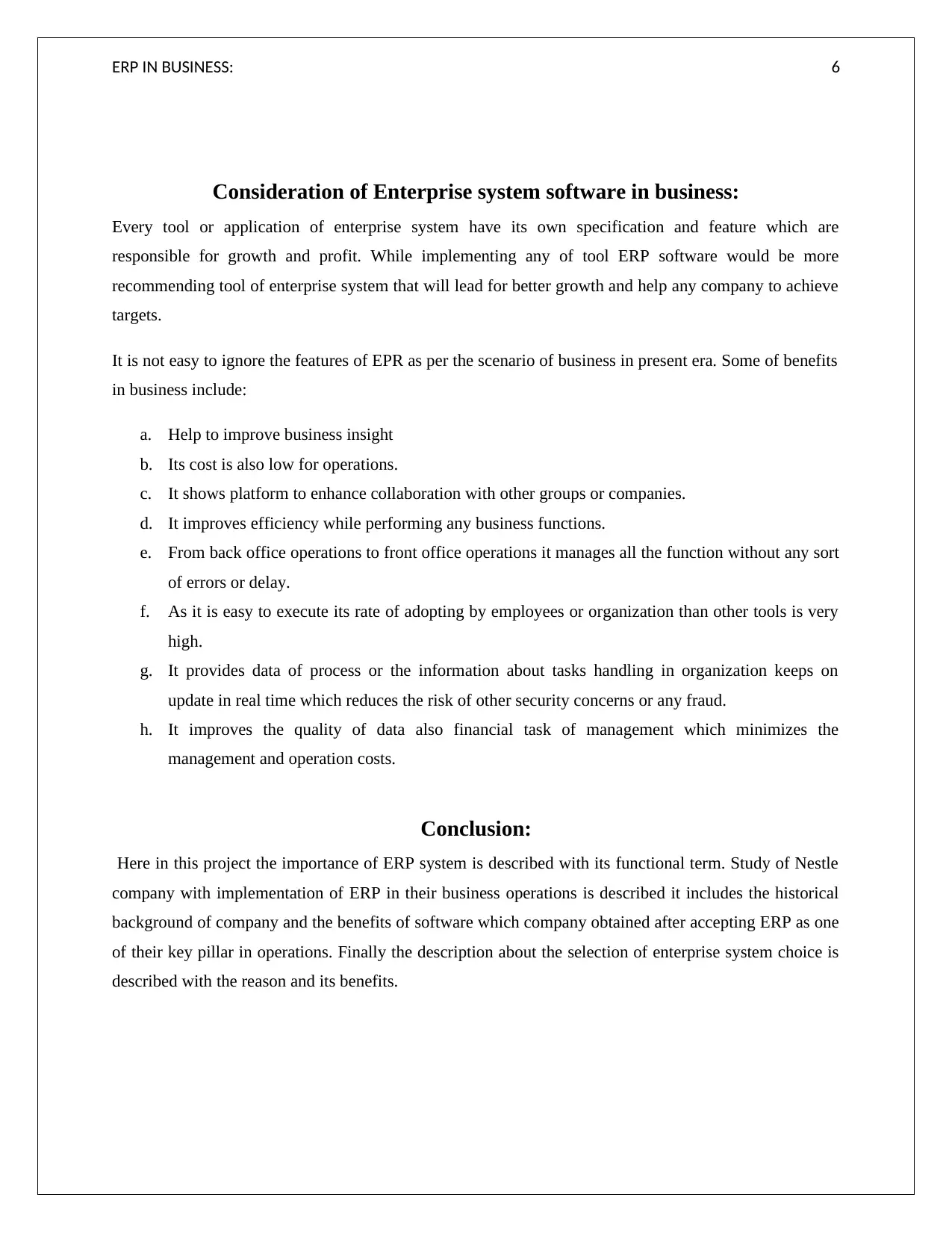
ERP IN BUSINESS: 6
Consideration of Enterprise system software in business:
Every tool or application of enterprise system have its own specification and feature which are
responsible for growth and profit. While implementing any of tool ERP software would be more
recommending tool of enterprise system that will lead for better growth and help any company to achieve
targets.
It is not easy to ignore the features of EPR as per the scenario of business in present era. Some of benefits
in business include:
a. Help to improve business insight
b. Its cost is also low for operations.
c. It shows platform to enhance collaboration with other groups or companies.
d. It improves efficiency while performing any business functions.
e. From back office operations to front office operations it manages all the function without any sort
of errors or delay.
f. As it is easy to execute its rate of adopting by employees or organization than other tools is very
high.
g. It provides data of process or the information about tasks handling in organization keeps on
update in real time which reduces the risk of other security concerns or any fraud.
h. It improves the quality of data also financial task of management which minimizes the
management and operation costs.
Conclusion:
Here in this project the importance of ERP system is described with its functional term. Study of Nestle
company with implementation of ERP in their business operations is described it includes the historical
background of company and the benefits of software which company obtained after accepting ERP as one
of their key pillar in operations. Finally the description about the selection of enterprise system choice is
described with the reason and its benefits.
Consideration of Enterprise system software in business:
Every tool or application of enterprise system have its own specification and feature which are
responsible for growth and profit. While implementing any of tool ERP software would be more
recommending tool of enterprise system that will lead for better growth and help any company to achieve
targets.
It is not easy to ignore the features of EPR as per the scenario of business in present era. Some of benefits
in business include:
a. Help to improve business insight
b. Its cost is also low for operations.
c. It shows platform to enhance collaboration with other groups or companies.
d. It improves efficiency while performing any business functions.
e. From back office operations to front office operations it manages all the function without any sort
of errors or delay.
f. As it is easy to execute its rate of adopting by employees or organization than other tools is very
high.
g. It provides data of process or the information about tasks handling in organization keeps on
update in real time which reduces the risk of other security concerns or any fraud.
h. It improves the quality of data also financial task of management which minimizes the
management and operation costs.
Conclusion:
Here in this project the importance of ERP system is described with its functional term. Study of Nestle
company with implementation of ERP in their business operations is described it includes the historical
background of company and the benefits of software which company obtained after accepting ERP as one
of their key pillar in operations. Finally the description about the selection of enterprise system choice is
described with the reason and its benefits.
Paraphrase This Document
Need a fresh take? Get an instant paraphrase of this document with our AI Paraphraser
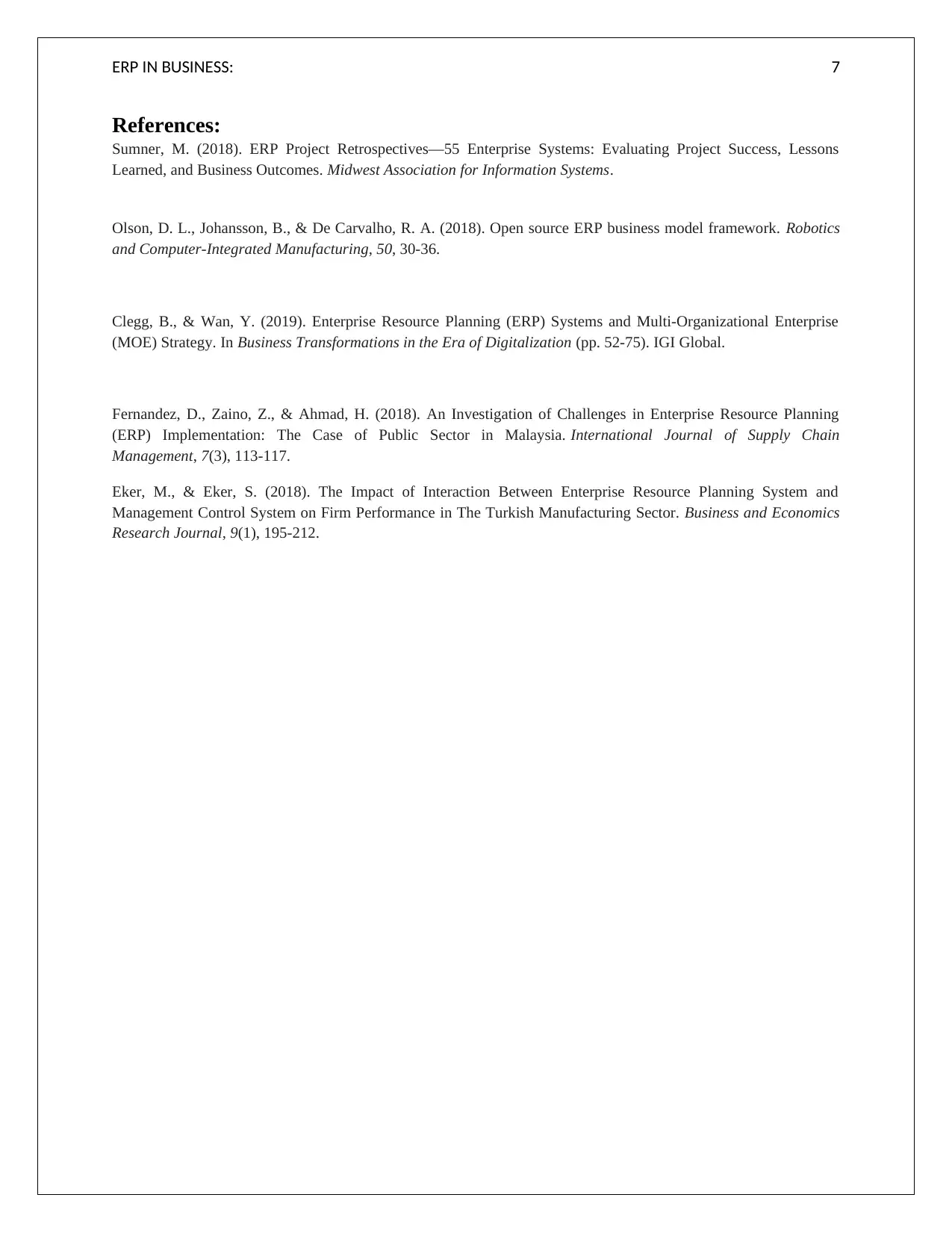
ERP IN BUSINESS: 7
References:
Sumner, M. (2018). ERP Project Retrospectives—55 Enterprise Systems: Evaluating Project Success, Lessons
Learned, and Business Outcomes. Midwest Association for Information Systems.
Olson, D. L., Johansson, B., & De Carvalho, R. A. (2018). Open source ERP business model framework. Robotics
and Computer-Integrated Manufacturing, 50, 30-36.
Clegg, B., & Wan, Y. (2019). Enterprise Resource Planning (ERP) Systems and Multi-Organizational Enterprise
(MOE) Strategy. In Business Transformations in the Era of Digitalization (pp. 52-75). IGI Global.
Fernandez, D., Zaino, Z., & Ahmad, H. (2018). An Investigation of Challenges in Enterprise Resource Planning
(ERP) Implementation: The Case of Public Sector in Malaysia. International Journal of Supply Chain
Management, 7(3), 113-117.
Eker, M., & Eker, S. (2018). The Impact of Interaction Between Enterprise Resource Planning System and
Management Control System on Firm Performance in The Turkish Manufacturing Sector. Business and Economics
Research Journal, 9(1), 195-212.
References:
Sumner, M. (2018). ERP Project Retrospectives—55 Enterprise Systems: Evaluating Project Success, Lessons
Learned, and Business Outcomes. Midwest Association for Information Systems.
Olson, D. L., Johansson, B., & De Carvalho, R. A. (2018). Open source ERP business model framework. Robotics
and Computer-Integrated Manufacturing, 50, 30-36.
Clegg, B., & Wan, Y. (2019). Enterprise Resource Planning (ERP) Systems and Multi-Organizational Enterprise
(MOE) Strategy. In Business Transformations in the Era of Digitalization (pp. 52-75). IGI Global.
Fernandez, D., Zaino, Z., & Ahmad, H. (2018). An Investigation of Challenges in Enterprise Resource Planning
(ERP) Implementation: The Case of Public Sector in Malaysia. International Journal of Supply Chain
Management, 7(3), 113-117.
Eker, M., & Eker, S. (2018). The Impact of Interaction Between Enterprise Resource Planning System and
Management Control System on Firm Performance in The Turkish Manufacturing Sector. Business and Economics
Research Journal, 9(1), 195-212.
1 out of 8
Related Documents
Your All-in-One AI-Powered Toolkit for Academic Success.
+13062052269
info@desklib.com
Available 24*7 on WhatsApp / Email
![[object Object]](/_next/static/media/star-bottom.7253800d.svg)
Unlock your academic potential
Copyright © 2020–2026 A2Z Services. All Rights Reserved. Developed and managed by ZUCOL.





